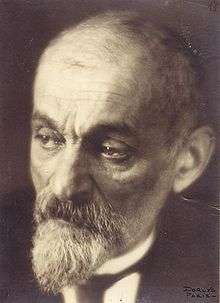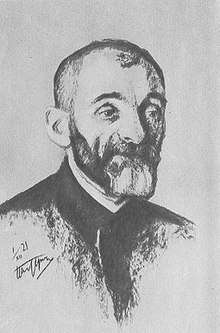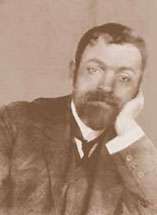Lev Shestov
Lev Isaakovich Shestov (Russian: Лев Исаа́кович Шесто́в, 1866 – 1938), born Yehuda Leib Shvartsman (Russian: Иегуда Лейб Шварцман), was a Russian existentialist philosopher, known for his "philosophy of despair". Born in Kiev (Russian Empire) on February 12 [O.S. January 31] 1866, he emigrated to France in 1921, fleeing from the aftermath of the October Revolution. He lived in Paris until his death on November 19, 1938.
Lev Shestov | |
|---|---|
 | |
| Born | February 12, 1866 |
| Died | November 19, 1938 (aged 72) Paris, France |
| Era | 19th-century philosophy |
| Region | Western philosophy |
| School | Christian existentialism |
Main interests | Theology, nihilism |
Notable ideas | Philosophy of despair |
Influences
| |
Life
Shestov was born Lev Isaakovich Schwarzmann in Kiev into a Jewish family. He obtained an education at various places, due to fractious clashes with authority. He went on to study law and mathematics at the Moscow State University but after a clash with the Inspector of Students he was told to return to Kiev, where he completed his studies.
Shestov's dissertation prevented him from becoming a doctor of law, as it was dismissed by University of Kiev on account of its revolutionary tendencies. In 1898 he entered a circle of prominent Russian intellectuals and artists which included Nikolai Berdyaev, Sergei Diaghilev, Dmitri Merezhkovsky and Vasily Rozanov. Shestov contributed articles to a journal the circle had established. During this time he completed his first major philosophical work, Good in the Teaching of Tolstoy and Nietzsche: Philosophy and Preaching; two authors profoundly impacting Shestov's thought.
He developed his thinking in a second book on Fyodor Dostoyevsky and Frederich Nietzsche, which increased Shestov's reputation as an original and incisive thinker. In All Things Are Possible (published in 1905) Shestov adopted the aphoristic style of Friedrich Nietzsche to investigate the difference between Russian and European Literature. Although on the surface it is an exploration of numerous intellectual topics, at its base it is a sardonic work of Existentialist philosophy which both criticizes and satirizes our fundamental attitudes towards life situations. D.H. Lawrence, who wrote the Foreword to S.S. Koteliansky's literary translation of the work,[1] summarized Shestov's philosophy with the words: " 'Everything is possible' - this is his really central cry. It is not nihilism. It is only a shaking free of the human psyche from old bonds. The positive central idea is that the human psyche, or soul, really believes in itself, and in nothing else".[2] Shestov deals with key issues such as religion, rationalism, and science in this highly approachable work, topics he would also examine in later writings such as In Job's Balances.[3] Shestov's own key quote from this work is probably the following: "...we need to think that only one assertion has or can have any objective reality: that nothing on earth is impossible. Every time someone wants to force us to admit that there are other, more limited and limiting truths, we must resist with every means we can lay hands on".
Shestov's works were not met with approval even by some of his closest Russian friends. Many saw in Shestov's work a renunciation of reason and metaphysics, and even an espousal of nihilism. Nevertheless, he would find admirers in such writers as D. H. Lawrence and his friend Georges Bataille.
In 1908 Shestov moved to Freiburg, Germany, and he stayed there until 1910, when he moved to a small Swiss village named Coppet. During this time the author worked prolifically. One of the fruits of these labours was the publication of Great Vigils and Penultimate Words. He returned to Moscow in 1915, and in this year his son Sergei died in combat against the Germans. During the Moscow period, his work became more influenced by matters of religion and theology. The seizure of government by the Bolsheviks in 1917 made life difficult for Shestov, and the Marxists pressured him to write a defence of Marxist doctrine as an introduction to his new work, Potestas Clavium; otherwise it would not be published. Shestov refused this, yet with the permission of the authorities he lectured at the University of Kiev on Greek philosophy.

Shestov's dislike of the Soviet regime led him to undertake a long journey out of Russia, and he eventually ended up in France. The author was a popular figure in France, where his originality was quickly recognized. In Paris, he soon befriended, and much influenced, the young Georges Bataille. That this Russian was newly appreciated is attested by his having been asked to contribute to a prestigious French philosophy journal. In the interwar years, Shestov continued to develop into a thinker of great prominence. During this time he had become totally immersed in the study of such great theologians as Blaise Pascal and Plotinus, whilst at the same time lecturing at the Sorbonne in 1925. In 1926 he was introduced to Edmund Husserl, with whom he maintained a cordial relationship despite radical differences in their philosophical outlook. In 1929, during a return to Freiburg he met with Edmund Husserl, and was urged to study Danish philosopher Søren Kierkegaard.[4]
The discovery of Kierkegaard prompted Shestov to realise that his philosophy shared great similarities, such as his rejection of idealism, and his belief that man can gain ultimate knowledge through ungrounded subjective thought rather than objective reason and verifiability. However, Shestov maintained that Kierkegaard did not pursue this line of thought far enough, and continued where he thought the Dane left off. The results of this tendency are seen in his work Kierkegaard and Existential Philosophy: Vox Clamantis in Deserto, published in 1936, a fundamental work of Christian existentialism.
Despite his weakening condition Shestov continued to write at a quick pace, and finally completed his magnum opus, Athens and Jerusalem. This work examines the dichotomy between freedom and reason, and argues that reason be rejected in the discipline of philosophy. Furthermore, it adumbrates the means by which the scientific method has made philosophy and science irreconcilable, since science concerns itself with empirical observation, whereas (so Shestov argues) philosophy must be concerned with freedom, God and immortality, issues that cannot be solved by science.
In 1938, Shestov contracted a serious illness whilst at his vacation home. During this final period, he continued his studies, concentrating in particular on Indian philosophy as well as the works of his contemporary and friend Edmund Husserl, who had died recently. Shestov himself died at a clinic in Paris.
Philosophy
The philosophy of despair

Shestov's philosophy is, at first sight, not a philosophy at all: it offers no systematic unity, no coherent set of propositions, no theoretical explanation of philosophical problems. Most of Shestov's work is fragmentary. With regard to the form (he often used aphorisms) the style may be deemed more web-like than linear, and more explosive than argumentative. The author seems to contradict himself on every page, and even seeks out paradoxes. This is because he believes that life itself is, in the last analysis, deeply paradoxical, and not comprehensible through logical or rational inquiry. Shestov maintains that no theory can solve the mysteries of life. Fundamentally, his philosophy is not 'problem-solving', but problem-generating, with a pronounced emphasis on life's enigmatic qualities.
His point of departure is not a theory, or an idea, but an experience, the experience of despair, which Shestov describes as the loss of certainties, the loss of freedom, the loss of the meaning of life. The root of this despair is what he frequently calls 'Necessity', but also 'Reason', 'Idealism' or 'Fate': a certain way of thinking (but at the same time also a very real aspect of the world) that subordinates life to ideas, abstractions, generalisations and thereby kills it, through an ignoring of the uniqueness and livingness of reality.
'Reason' is the obedience to and the acceptance of Certainties that tell us that certain things are eternal and unchangeable and other things are impossible and can never be attained. This accounts for Shestov's philosophy being a form of irrationalism, though it is important to note that the thinker does not oppose reason, or science in general, but only rationalism and scientism: the tendency to consider reason as a sort of omniscient, omnipotent God that is good for its own sake. It may also be considered a form of personalism: people cannot be reduced to ideas, social structures, or mystical oneness. Shestov rejects any mention of "omnitudes", "collective", "all-unity." As he explains in his masterpiece Athens and Jerusalem:
"But why attribute to God, the God whom neither time nor space limits, the same respect and love for order? Why forever speak of "total unity"? If God loves men, what need has He to subordinate men to His divine will and to deprive them of their own will, the most precious of the things He has bestowed upon them? There is no need at all. Consequently, the idea of total unity is an absolutely false idea....It is not forbidden for reason to speak of unity and even of unities, but it must renounce total unity - and other things besides. And what a sigh of relief men will breathe when they suddenly discover that the living God, the true God, in no way resembles Him whom reason has shown them until now!"
Through this attack on the "self-evident", Shestov implies that we are all seemingly alone with our suffering, and can be helped neither by others, nor by philosophy. This explains his lack of a systematic philosophical framework.
Penultimate words: surrender versus struggle
But despair is not the last word, it is only the 'penultimate word'. The last word cannot be said in human language, can't be captured in theory. His philosophy begins with despair, his whole thinking is desperate, but Shestov tries to point to something beyond despair - and beyond philosophy.
This is what he calls 'faith': not a belief, not a certainty, but another way of thinking that arises in the midst of the deepest doubt and insecurity. It is the experience that "everything is possible" (Dostoevsky), that the opposite of Necessity is not chance or accident, but possibility, that there does exist a god-given freedom without boundaries, without walls or borders. Shestov maintains that we should continue to struggle, to fight against Fate and Necessity, even when a successful outcome is not guaranteed. Exactly at the moment that all the oracles remain silent, we should give ourselves over to God, who alone can comfort the sick and suffering soul. In some of his most famous words he explains:
"Faith, only the faith that looks to the Creator and that He inspires, radiates from itself the supreme and decisive truths condemning what is and what is not. Reality is transfigured. The heavens glorify the Lord. The prophets and apostles cry in ecstasy, "O death, where is thy sting? Hell, where is thy victory?" And all announce: "Eye hath not seen, nor ear heard, neither have entered into the heart of man, the things which God hath prepared for them that love Him." (Quoting 1 Corinthians 15:55, 2:9)
Furthermore, although a Jewish philosopher, Shestov saw in the resurrection of Christ this victory over necessity. He described the incarnation and resurrection of Jesus as a transfiguring spectacle by which it is demonstrated that the purpose of life is not "mystical" surrender to the "absolute", but ascetical struggle:
"Cur Deus homo? Why, to what purpose, did He become man, expose himself to injurious mistreatment, ignominious and painful death on the cross? Was it not in order to show man, through His example, that no decision is too hard, that it is worth while bearing anything in order not to remain in the womb of the One? That any torture whatever to the living being is better than the 'bliss' of the rest-satiate 'ideal' being?"
Likewise, the final words of his last and greatest work, Athens and Jerusalem, are: "Philosophy is not Besinnen [think over] but struggle. And this struggle has no end and will have no end. The kingdom of God, as it is written, is attained through violence." (cf Matthew 11:12)
Influence
Shestov was highly admired and honored by Nikolai Berdyaev and Sergei Bulgakov in Russia, Jules de Gaultier, Georges Bataille, Lucien Lévy-Bruhl, Paul Celan, Gilles Deleuze, and Albert Camus in France, and D. H. Lawrence, Isaiah Berlin and John Middleton Murry in England. Among Jewish thinkers, he influenced Hillel Zeitlin.
Today, Shestov is little known in the English-speaking world. This is partly because his works have not been readily available. Partly the specific themes he discusses are unfashionable and "foreign". A sombre and yet ecstatic atmosphere permeates his writings. And his quasi-nihilistic position and religious outlook are an unsettling and incongruous combination, at first sight.
He did however influence writers such as Albert Camus (who wrote about him in Le Mythe de Sisyphe), Benjamin Fondane (his 'pupil'), the poet Paul Celan, and notably Emil Cioran, who writes about Shestov:
- "He was the philosopher of my generation, which didn't succeed in realizing itself spiritually, but remained nostalgic about such a realization. Shestov [...] has played an important role in my life. [...] He thought rightly that the true problems escape the philosophers. What else do they do but obscuring the real torments of life?" (Emil Cioran: Oeuvres, Gallimard, Paris 1995, p. 1740, my translation.)
Shestov also appears in the work of Gilles Deleuze; he is referred to sporadically in Nietzsche and Philosophy and also appears in Difference and Repetition.
Leo Strauss wrote "Jerusalem and Athens" in part as a response to Shestov's "Athens and Jerusalem".
More recently, alongside Dostoyevsky's philosophy, many have found solace in Shestov's battle against the rational self-consistent and self-evident; for example Bernard Martin of Case Western Reserve University, who translated his works now found online [external link below]; and the scholar Liza Knapp,[6] who wrote The Annihilation of Inertia: Dostoevsky and Metaphysics. This book was an evaluation of Dostoyevsky's struggle against the self-evident "wall", and refers to Shestov on several occasions.
According to Michael Richardson's research on Georges Bataille, Shestov was an early influence on Bataille and was responsible for exposing him to Nietzsche. He argues that Shestov's radical views on theology and an interest in extreme human behavior probably coloured Bataille's own thoughts.
Main works
These are Shestov's most important works, in their English translations, and with their date of writing:
- The Good in the Teaching of Tolstoy and Nietzsche, 1899
- The Philosophy of Tragedy, Dostoevsky and Nietzsche, 1903
- All Things are Possible (Apotheosis of Groundlessness), 1905
- Potestas Clavium, 1919
- In Job's Balances, 1923–29
- Kierkegaard and the Existential Philosophy, 1933–34
- Athens and Jerusalem, 1930–37
References
- 'All Things Are Possible', Koteliansky Translation (1920 / Secker, London).
- 'Foreword' to 'All Things Are Possible' by D.H.Lawrence (1920).
- 'Introduction' to 'All Things Are Possible' by Prof. Edouard d'Araille (2001/LTP Ed.).
- Czeslaw Milosz, "Shestov, or the Purity of Despair", Emperor of the Earth (University of California Press, Berkeley, 1977), pp. 91–119
- Ramin Jahanbegloo, Conversations with Isaiah Berlin (London 2000), pp. 201–2
- Liza Knapp, "The Force of Inertia in Dostoevsky's 'Krotkaja'" Archived 2013-11-01 at the Wayback Machine, Dostoevsky Studies, Vol. 6 (1985), pp. 144–57
Further reading
- (in French) Geneviève Piron : Léon Chestov, philosophe du déracinement, Éditions L'Âge d'Homme, 2010 (ISBN 978-2-8251-3976-9).
External links
- Works by Lev Shestov at Project Gutenberg
- Works by Lev Shestov at LibriVox (public domain audiobooks)

- Gregory B Sadler, Existentialism: Lev Shestov, "The Theory of Knowledge on YouTube
- Gregory B Sadler, Existentialism: Lev Shestov, All Things are Possible (part 1) on YouTube
- Gregory B Sadler, Existentialism: Lev Shestov, All Things are Possible (part 2) on YouTube
- Gregory B Sadler, Existentialism: Lev Shestov, All Things are Possible (part 3) on YouTube
- The Lev Shestov Society homepage
- Martin, Bernard (1966). Lev Shestov - Introduction. Retrieved 2 January 2006.